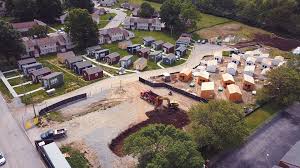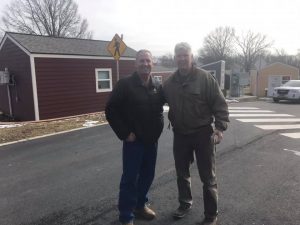Driving to work one day on a cold morning, I saw a homeless man with a sign at the sign of the road – ‘HOmeless veteran, any help appreciated’ Eventually I met several of these men and discovered them to be honorable patriots that had not been able to find steady work and accommodation since leaving the military. I believe we need to do better for these warriors who have left all in deployment to defend the freedoms we all enjoy.

The question to be answered is: ‘Will we do something like this to help the 140( current statistic obtained from the Community Service Council) homeless veterans here in Tulsa, Oklahoma?’
I am convinced it needs to be done and can be done with the support of the people of Tulsa: Kansas City did it, and though we are not affiliated in any way with this group, they have set an example about what should and can be done for homeless vets.
https://www.veteranscommunityproject.org/about
The VA does a great job with medical support, and there are resources here to help vets reintegrate into civilian life, but these resources are very tough to access living under a bridge or in a tent village.
Several months ago I drove up Kansas City to tour the tiny home community up there, to see what we can learn in my attempt to do something similar in Tulsa.

Veterans Community Project Update
https://www.chrisaomministries.com/2020/01/help-homeless-vets-in-tulsa-ok
Well, I have continued to stir the Tulsa pot to generate support for a transitional housing community of tiny homes for homeless veterans here in Tulsa, Oklahoma.
Last Spring I attended our City council meeting, and met briefly afterward with councilman Cas Fahler, and told him what I am trying to do. I asked him if the City might potentially get behind this project, and he bluntly asked: What do you need from the City? I said: Could you donate the land for this on a bus route so guys can get to work? His response was encouraging: ‘ I can’t speak for the rest of the council, but we definitely have land available, do you have a site plan?’At that point, I did not, but I contacted our architect from work, and though he is willing to help, this COVID insanity has really hurt his company, and presently he does not have staff available to produce actual drawings. I prayed about this and went to work to see what the requirements were for infrastructure.
So I thought back to my visit to the Kansas City Veterans Community Project, and remember how impressed I was with the community center and offices that housed the case managers that daily meet with vets to help them with everything from job searches to cooking classes, to obtaining medical and even dental treatment, and how impressed I was with the quality of care being provided our warriors, and ultimate patriots as they transition from military to civilian life. So I made an appointment and met with Dr. Horton at ‘The Coffee Bunker’ (https://www.coffeebunker.org/) and spoke with him about my desire. He is an amazing man, with a real heart to help vets transition into normal life here back home. They provide a drop-in coffee house, that provides services to help vets transition, and he too sees the need for transitional housing or homeless vets. He taught me a new word that seems to fit what we need to do here: Bivouac:
He told me that they already have access several hundred permanent housing units available to them, but that unless people received the counseling and lifeskills training our program would offer, it has been his experience that most vets crash and burn being placed in permanent housing units, often getting evicted within the first two months, due to lack of community support and lack of accountability and life skills.
Here’s a scenario in real life. So, the case managers and transitional support team do their job and get a vet their benefits so they now have enough money to easily live well, and they get that monthly check. Unfortunately, many hit the casino and blow it all in a night, instead of having a friend call up and say:’Hey you get your check soldier? Instead of hitting the casino, let’s go out to eat, and pay some bills’. Suddenly, the slogan becomes real ‘No man left behind’ and that warrior has a far better month than playing the one-arm bandits for a night.
In the facility I saw in Kansas City, this was addressed daily, through great community support and the work of the staff there, and a large community of volunteer vets helping other vets, keeping military honor and freedom alive.

Visiting with Chris Amire, associate director of Veterans Community Project – Kansas City
SO I asked Dr Horton point-blank. “Sir, f I can get this facility built, would you be willing to move your office and staff into it, to provide all the transitional services you are experienced in’ HE said: ‘Sure, that there is a need for transitional housing for vets here in Tulsa, and this program could fill the gap in services available for the homeless veteran population here in town.[1]
 [1] According to statistics obtained from CRC. The Community Research Council, the VA records at least 140 homeless vets are on the streets of Tulsa, OK.
[1] According to statistics obtained from CRC. The Community Research Council, the VA records at least 140 homeless vets are on the streets of Tulsa, OK.
As we have met and brainstormed, we recognize the need for a community food bank that serves the community during these covid insane times.
The community center becomes the hub of the community, and if done right can house office space for case managers, transition counsellors, intake and outreach workers, and it become a one-stop shop for veterans to receive community services all workin together in this mission, to deliberately develop a support and accountability network so that veterans can get back on their feet and transition to permanent housing. A school or community building could be remodeled to provide all these services under one roof.
Tiny homes are sized at 16×20′ footprint or just over 300sf of living space/veteran. We could build a couple units as large as 1000sf for military families in transition.

